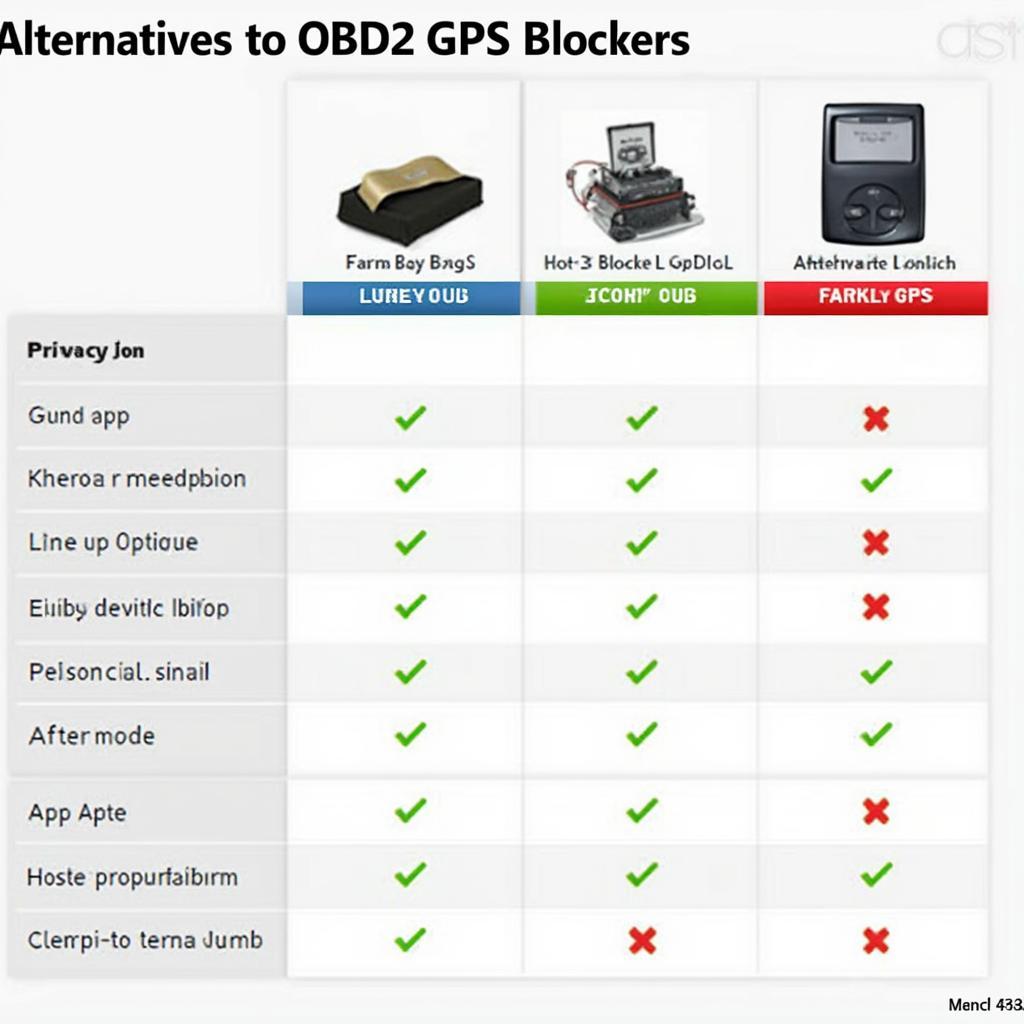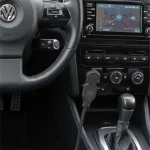OBD2 GPS blockers are devices designed to interfere with the GPS signal of a vehicle, preventing it from being tracked. This article dives deep into the world of OBD2 GPS blockers, exploring their functionality, legality, and potential implications. We’ll cover everything from how they work to the ethical considerations surrounding their use.
How Does an OBD2 GPS Blocker Work?
An OBD2 GPS blocker typically plugs into the vehicle’s OBD2 port, the same port used for diagnostics. It then emits a radio frequency signal that jams or disrupts the GPS signals received by the vehicle’s GPS receiver or any GPS tracker connected to the OBD2 port. This effectively blocks the transmission of location data. Some blockers are designed to only block specific frequencies, while others create a wider jamming effect.
There are different types of OBD2 GPS blockers, including those that target specific satellite navigation systems like GPS, GLONASS, Galileo, or BeiDou. Some advanced models offer selective jamming, allowing users to block only certain signals while leaving others unaffected.
Is Using an OBD2 GPS Blocker Legal?
The legality of using an OBD2 GPS blocker varies significantly depending on your location and the specific application. In many jurisdictions, using a device that intentionally jams or disrupts GPS signals is illegal, especially if it interferes with public safety or critical infrastructure. It’s essential to research and understand the specific laws in your area before using any type of GPS jamming device.
While some argue for their use in privacy protection, unauthorized use of GPS jammers can have serious consequences, including hefty fines and even imprisonment.
Why Would Someone Use an OBD2 GPS Blocker?
People might consider using an OBD2 GPS blocker for a variety of reasons, including privacy concerns, protecting against vehicle theft, or preventing unauthorized tracking. Some individuals might feel uncomfortable with the idea of their location being constantly monitored, while others might be concerned about the potential for data breaches or misuse of their location information.
However, it’s crucial to weigh these concerns against the potential legal ramifications and ethical considerations. Are there alternative, legal methods to achieve the desired privacy or security?
Understanding the Ethical Implications
Using an OBD2 GPS blocker raises several ethical questions. While personal privacy is a valid concern, interfering with GPS signals can have unintended consequences. For example, it could disrupt emergency services that rely on GPS for navigation or interfere with law enforcement efforts to track stolen vehicles.
Alternatives to OBD2 GPS Blockers
If your primary concern is privacy, consider alternative solutions that don’t involve illegal jamming techniques. These could include using privacy-focused navigation apps, disabling location services on your phone or vehicle’s infotainment system, or using Faraday bags to shield your devices from GPS signals. For vehicle security, consider investing in a reputable aftermarket alarm system or other anti-theft devices.
 Alternatives to OBD2 GPS Blockers
Alternatives to OBD2 GPS Blockers
Conclusion
OBD2 GPS blockers offer a way to disrupt GPS tracking, but their use is often fraught with legal and ethical complexities. Before considering using such a device, thoroughly research the laws in your jurisdiction and explore alternative solutions that address your concerns without resorting to illegal jamming techniques. Understanding the potential implications of using an OBD2 GPS blocker is crucial for making informed decisions.
FAQ
-
What is the range of an OBD2 GPS blocker? The range varies depending on the device, but typically covers a small area around the vehicle.
-
Can an OBD2 GPS blocker be detected? Sophisticated detection equipment can identify the presence of GPS jamming devices.
-
Do OBD2 GPS blockers affect other car functions? A properly designed blocker should not interfere with other vehicle systems.
-
Are there legal uses for GPS jammers? Certain government and military applications may have authorized use of GPS jamming technology.
-
What are the penalties for illegal GPS jamming? Penalties can range from significant fines to imprisonment, depending on the jurisdiction and the severity of the offense.
-
Can an OBD2 GPS blocker be used to prevent repossession? While it might temporarily delay the process, it’s ultimately illegal and unethical to interfere with legal repossession efforts.
-
Can an OBD2 GPS blocker protect against sophisticated tracking methods? Not all tracking methods rely solely on GPS. Other technologies might still be able to track the vehicle.
Common Scenarios and Questions
Scenario: A company wants to prevent competitors from tracking their delivery vehicles.
Question: Is it legal to use an OBD2 GPS blocker for this purpose? Answer: No, it’s generally illegal to use GPS jammers for competitive advantage.
Scenario: An individual is concerned about their privacy and wants to prevent their vehicle’s location from being tracked.
Question: What are the legal and ethical implications of using an OBD2 GPS blocker in this scenario? Answer: While privacy is a valid concern, using a GPS jammer is often illegal. Explore alternative methods for protecting your privacy, such as disabling location services or using privacy-focused apps.
Further Reading and Resources
Explore more articles on our website about vehicle security, privacy, and OBD2 technology. We also have resources on alternative tracking methods and legal ways to protect your privacy.
Need help? Contact us!
For any questions or support related to OBD2 scanners and related technology, please don’t hesitate to contact us.
- WhatsApp: +1(641)206-8880
- Email: [email protected]
- Address: 789 Elm Street, San Francisco, CA 94102, USA
Our customer support team is available 24/7 to assist you.

